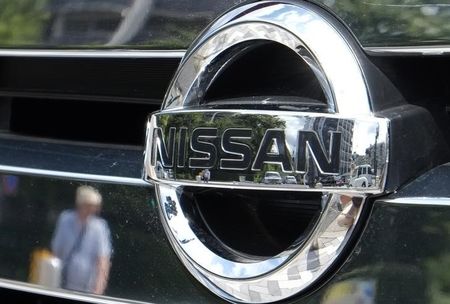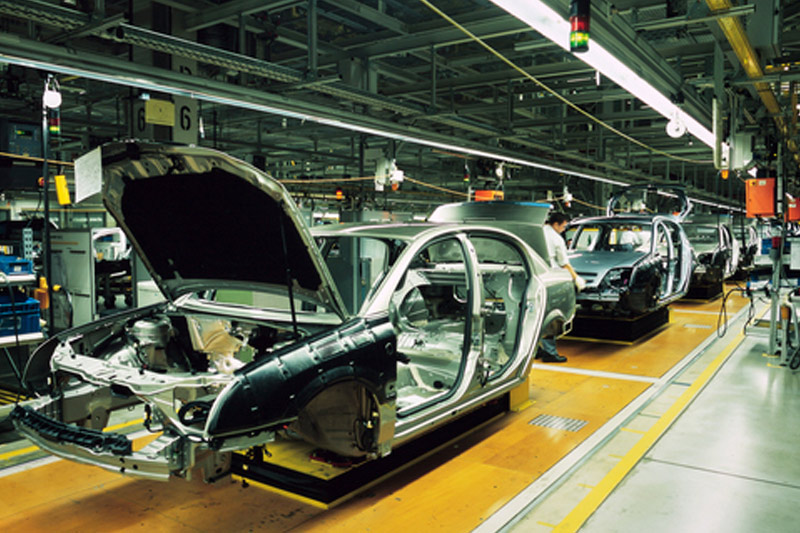By Laurence Frost
PARIS (Reuters) - Nissan (T:7201) boss Carlos Ghosn is preparing to cut battery manufacturing, people familiar with the matter said, in a new reversal on electric cars that has re-opened deep divisions with alliance partner Renault (PA:RENA).
The plan, which faces stiff resistance within the Japanese carmaker, would see U.S. and British production phased out and a reduced output of next-generation batteries concentrated at its domestic plant, two alliance sources told Reuters.
In what may also prove a politically sensitive blow to Japan Inc., Nissan would follow Renault by taking cheaper batteries from South Korea's LG Chem (KS:051910) for some future vehicles, including models made in China.
"We set out to be a leader in battery manufacturing but it turned out to be less competitive than we'd wanted," said one executive on condition of anonymity. "We're still between six months and a year behind LG in price-performance terms."
A decision is due next month on the Nissan battery plants in Sunderland, England, and Smyrna, Tennessee, the sources said, following a tense procurement review with 43.4 percent shareholder Renault, the smaller but senior partner in their 15-year-old alliance.
"Renault would clearly prefer to go further down the LG sourcing route, and the Nissan engineers would obviously prefer to stay in-house," another insider said. "The write-off costs are potentially huge."
Responding to the Reuters report, Ghosn said that Nissan may open battery procurement to LG and other suppliers, adding that no decision had yet been made.
Alliance spokeswoman Rachel Konrad said Renault-Nissan was "100-percent committed to its industry-leading electric vehicle program" and had no plans to write down battery investments.
Nissan is already negotiating with manufacturing partner NEC Corp. (T:6701) on the shift to dual sourcing, with Ghosn's backing, the sources said. Nissan currently makes all its own electric car batteries.
One option being explored would see LG, which supplies some Renault models, invest in its own battery production at one of the overseas Nissan plants as the carmaker halts operations at the sites.
The alliance is also in talks with LG on a deal to supply batteries for future Renault and Nissan electric models in China, one of the sources added.
NEC and LG declined to comment.
Under Ghosn, who heads both companies, Renault-Nissan bet more on electric cars than any mainstream competitor, pledging in 2009 to invest 4 billion euros ($5.2 billion) to build models including the Nissan Leaf compact and as many as 500,000 batteries per year to power them.
Nissan and NEC invested 23 billion yen ($215 million) in their Zama, Japan battery plant and electrode manufacturing, backed by government aid. U.S. and British taxpayers also helped with the $1 billion invested in Tennessee and 210 million pounds ($341 million) in Sunderland.
But the mass consumer was largely unmoved - or deterred by the sluggish rollout of recharging networks - despite generous sales incentives in key markets.
Global electric car sales will remain shy of 1 million in 2020, according to forecaster IHS Automotive, less than one percent of the total vehicle market, and one-tenth of the demand Ghosn had predicted.
"Renault-Nissan were definitely ahead of their time - in a bad way," said Stuart Pearson, an Exane BNP analyst.
"There's nothing wrong with ambition, but when that involves excess investment then it's also a risk," he said. "Their targets were really excessive on volume and battery capacity."
The alliance has begun a belated push into faster-selling hybrids, combining electric and combustion-engine propulsion. Upscale electric rivals such as Tesla's (O:TSLA) Model S meanwhile hog the limelight, backed by big investments in newer, cheaper battery technologies.
INTERNAL RIVALRIES
Ghosn dropped extra battery sites planned for both alliance carmakers, leaving Nissan with the entire production capacity of 220,000 power packs through the NEC joint venture, AESC.
But that still far exceeds the 67,000 electric cars Renault-Nissan sold last year, and even the 176,000 registered to date. A pledge to reach 1.5 million by 2016 has been scrapped.
The coming hybrids will fill some of the excess plant capacity, although they use fewer power cells per vehicle. An all-electric Tesla rival is still planned for Nissan's premium Infiniti brand in 2018 with batteries as big as 60 kilowatt-hours (kWh), more than twice the energy capacity of the Leaf, which is due for replacement the previous year.
Nissan is seeking to unwind a ruinous NEC contract that requires it to purchase electrodes for the full capacity of 220,000 Leaf-sized 24 kWh batteries regardless of actual sales, sources said. The joint venture partner's consent is also needed to bring LG production or other activities onto the Tennessee or Sunderland sites, which together employ 500 workers.
The financial hit for Nissan "will depend on what else we can do with the plants", with heavy charges likely if both are closed, one manager added.
Renault has already taken at least one writedown of 85 million euros on its over-investment in electric cars following the collapse of Better Place - a charging startup that had ordered 100,000 of its battery-powered Fluence sedans.
The Nissan procurement shift could still be thwarted by capacity-cutting costs including repayment of U.S. and British government support. Next-generation battery manufacturing at Zama would also likely need fresh Japanese aid to compete with LG and its subsidies from Seoul, sources said.
Navigating the battery backtrack is a key test for CEO Ghosn as he demands closer Renault-Nissan integration from executives mandated to pursue savings across the alliance.
For Nissan, the plant cuts would be a partial retreat from the automotive battery market - expected to top $20 billion by 2020 - just as California-based Tesla builds its $5 billion "Gigafactory" with Panasonic (T:6752) in Nevada.
Japanese engineers are still smarting from Renault's 2010 move to drop Nissan batteries and purchase LG for its flagship Zoe model, worsening the overcapacity problem.
"It was a 15-20 percent cost gap," said one of the people involved in the Renault decision. "In purchasing, 3-4 percent is usually enough to choose a partner for."
Today's Nissan batteries come in at $270 per kWh, based on replacement prices thought to be below cost, according to consulting firm AlixPartners. The true manufacturing cost is believed to be over $300, inflated by the amortization of unused plant capacity and the burdensome electrodes deal.
The next generation will have lithium nickel manganese cobalt oxide (NMC) cathodes, as used by LG, rather than the current lithium manganese oxide (LMO) chemistry. The alliance cost target is $200/kWh, whether made or bought, sources said.
With a clean slate and sufficient volume, Nissan engineers insist, their next generation of batteries could be competitive on price as well as keeping crucial know-how at the company.
"When you're developing cutting-edge technology, the best way to know about that technology is to build it in-house," said one. "That's what Tesla is doing."
Many of the past missteps can be traced to internal rivalries of the kind Ghosn is only now moving to stamp out.
Former Nissan second-in-command Carlos Tavares, racing to beat the Renault Zoe to market, cut Leaf development by a year and skipped a critical battery redesign, according to alliance veterans. Nissan later cut prices, settled a class action and offered retroactive warranties to answer customer concerns about battery deterioration. Tavares now heads PSA Peugeot Citroen.
His Renault archrival at the time, Patrick Pelata, signed a confidentiality deal with LG that meant Nissan battery engineers never even knew what they were up against.
Against that backdrop, the atmosphere may be charged when Nissan engineering boss Hideyuki Sakamoto puts final arguments against the outsourcing plan in a presentation to Ghosn as soon as this week.
But the CEO's mind may be all but made up.

"We have to open up," Ghosn told reporters in Nantes, western France, where he was attending a test-drive event on Monday. "We will continue making batteries but we can't get stuck with supply monopolies - even internal ones."
(Additional reporting by Yoko Kubota in Tokyo and Gilles Guillaume in Paris; Editing by Mark Potter and Greg Mahlich)
